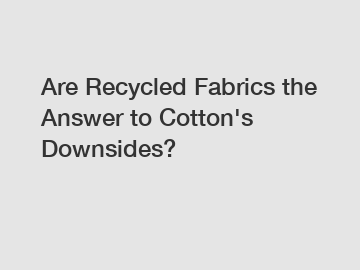Are Recycled Fabrics the Answer to Cotton's Downsides?
Are Recycled Fabrics the Answer to Cotton's Downsides?
The fashion industry has long grappled with the environmental and social consequences of using cotton, one of the most widely cultivated and utilized fabrics. However, with the growing awareness of sustainability and the demand for eco-friendly alternatives, recycled fabrics have emerged as a potential solution. Are recycled fabrics truly the answer to cotton's downsides? Let's delve into this intriguing question.
I. Environmental Impact.

Cotton production is notorious for its immense water consumption and heavy use of pesticides. Recycled fabrics, on the other hand, offer the advantage of minimizing both water usage and chemical contamination. By repurposing materials such as post-consumer plastic bottles or discarded garments, these fabrics help reduce waste and conserve valuable resources.
II. Energy Consumption.
The process of growing and producing conventional cotton demands significant energy input, often derived from non-renewable sources. In contrast, manufacturing recycled fabrics typically requires less energy due to the reduced need for agricultural practices and the avoidance of certain chemical-intensive processes. Embracing recycled textiles can contribute to reducing greenhouse gas emissions and lessening the fashion industry's carbon footprint.
III. Versatility.
Recycled fabrics come in various forms and can be used for an extensive range of applications. From clothing and accessories to home textiles and upholstery, these eco-friendly materials offer versatility without compromising style or quality. By embracing recycled fabrics, designers and consumers have the opportunity to make sustainable choices without sacrificing aesthetic appeal.
IV. Social Implications.
The social aspects of cotton production cannot be overlooked. Traditional cotton farming often involves exploitative labor practices and endangered worker welfare. Embracing recycled fabrics can support ethical fashion by minimizing the demand for labor-intensive cotton cultivation, ensuring a fairer and more equitable supply chain. By opting for recycled materials, we can inch closer to a fashion industry that values both the planet and the people.
V. Durability and Longevity.
While cotton has long been revered for its comfort and breathability, it is not the most durable fabric. Recycled textiles, however, can offer excellent durability and longevity. Many recycled fabrics are engineered to withstand wear and tear, making them an ideal choice for sustainable fashion. By investing in long-lasting garments made from recycled materials, we can reduce the cycle of fast fashion and its associated waste.
VI. Consumer Awareness and Perception.
The shift towards recycled fabrics is driven, to a large extent, by the increasing awareness and demand for sustainable fashion. As consumers become more conscious of the environmental impact of their choices, they are actively seeking out eco-friendly alternatives. This growing demand signals a change in consumer preferences and provides an opportunity for the fashion industry to embrace recycled fabrics as a viable solution to cotton's downsides.
In conclusion, recycled fabrics undoubtedly offer numerous advantages over conventional cotton. Their potential in mitigating cotton's environmental impact, reducing energy consumption, fostering social responsibility, and promoting long-lasting fashion cannot be ignored. However, it is vital to note that a complete transition to recycled fabrics may not be immediate or feasible. The fashion industry must continue to invest in research and development, collaborate with experts, and explore innovative manufacturing techniques to maximize the potential of recycled textiles. Only through collective efforts can we establish recycled fabrics as a definitive response to cotton's downsides and pave the way for a more sustainable future in fashion.
If you want to learn more, please visit our website 60 cotton 40 polyester, is combed cotton 100 cotton, hospital print fabric.

Comments